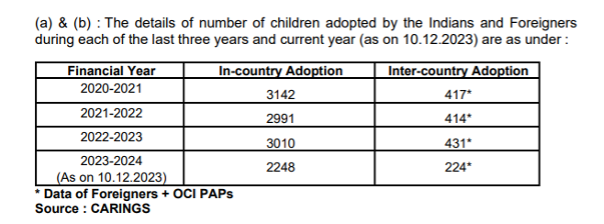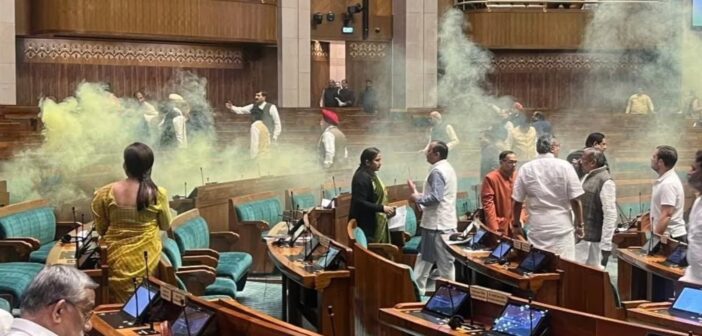The second week of the winter session of parliament was dominated by the major security scare where intruders jumped from the Visitor’s Gallery of the Lok Sabha and alleged to have sprayed something like a tear gas. The Delhi Police and Lok Sabha Secretariat are said to be investigating the security lapse. Multiple other bills were discussed and passed.
The last full-fledged session of the 17th Lok Sabha began last week on 04 December 2023 and is expected to conclude on 22 December 2023. This Winter Session is packed with a hefty lineup of legislative plans across 15 sittings spread over a period of 19 days. They aim at revamp of archaic colonial laws and also establish a structured system for appointing election commissioners. Among the anticipated bills up for debate are the Bharatiya Nyaya Sanhita Bill 2023, Bharatiya Nagarik Suraksha Sanhita Bill 2023, and Bharatiya Sakshya Bill 2023.
The second week of the session saw a huge security scare, with intruders entering the chambers. The intruders threw something that emitted fluorescent gas and were apprehended by the parliamentarians. The Delhi Police and Lok Sabha Secretariat are said to be investigating the security lapse.
In addition to this, some important discussions and debates happened during this week, with some key bills getting passed in Parliament.
Key developments
During the last week, the Post Office bill 2023, and the Advocates (Amendment) Bill 2023 were passed by Rajya Sabha and Lok Sabha respectively. In continuation of the debate from last week, the Jammu and Kashmir Reorganisation (Second Amendment) Bill, 2023, and the Jammu and Kashmir Reservation (Amendment) Bill 2023 were passed by both houses. Interestingly, these bills were passed on the same day on which the constitutional validity of the abrogation of Jammu and Kashmir’s special status under Article was upheld by the Supreme Court.
The Central Universities (Amendment) Bill, 2023, which allowed for the setting up of a tribal university in Telangana, by the name ‘Sammakka Sarakka Central Tribal University’ was passed by both houses of the Parliament. A short-notice discussion was held in Rajya Sabha on the economic situation of India, focussing on poverty, unemployment, and hunger.
The fifth day of the house saw a huge uproar over the report of the Ethics Committee on a ‘cash for query’ against Trinamool Congress MP Mahua Moitra. The Lower House of the Parliament expelled her through voice vote.
Further, Home Minister Amit Shah withdrew three bills that aimed to amend criminal laws. He presented revised versions of these bills: Bharatiya Nyaya Sanhita (BNS), Bharatiya Sakshya (BS), and Bharatiya Nagarik Suraksha Sanhita (BNSS).
Lok Sabha saw a passage of few other bills: it approved the Supplementary Demands for Grants – First Batch for 2023-2024 and also passed payments from the consolidated fund, Demands for Excess Grants for 2020-2021; it passed the Government of Union Territories (Amendment) Bill, 2023, and the Jammu and Kashmir Reorganisation (Second Amendment) Bill, 2023, and the Repealing and Amending Bill, 2023. The Finance Minister introduced the Provisional Collection of Taxes Bill, 2023, and the Central Goods and Services Act (Second Amendment) Bill, 2023 in the Lok Sabha.
In a significant development, the Rajya Sabha passed the Chief Election Commissioner and Other Election Commissioners (Appointment, Conditions of Service and Term of Office) Bill, 2023. This bill aims to standardize how the chief election commissioner (CEC) and other election commissioners are appointed, their service conditions, and their duration in office. It also suggests establishing a selection panel with the Prime Minister as chair, the Leader of the Opposition as a member, and a Union Cabinet Minister appointed by the Prime Minister as another member for appointing the CEC and other ECs. Earlier, the apex court ruled that the selection panel should consist of the Prime Minister, the Leader of the Opposition, and the Chief Justice of India. But such an arrangement was valid only till the parliament enacted a law. Despite the government’s assertion that the bill aligns with the apex court’s ruling, the opposition views it as a blow to the autonomy of the election commission. The opposition’s attempt to refer the bill to a select committee was declined.
Important Standing Committee reports
The second week of the session also saw the presentation of action-taken reports of various ministries/departments. Some of the important reports are as below.
- 37th Report on action taken by the Government on the Observations/Recommendations of the Committee contained in their 26th Report (Seventeenth Lok Sabha) on ‘Suspension of Telecom Services/Internet and its impact’ relating to the Ministry of Communications (Department of Telecommunications).
- 38th Report on action taken by the Government on the Observations/Recommendations of the Committee contained in their 27th Report (Seventeenth Lok Sabha) on ‘Ethical Standards in Media Coverage’ relating to the Ministry of Information and Broadcasting.
- 134th Report on action taken on 103rd Report of the Committee on ‘Functioning of the Virtual Courts/Court Proceedings through Video Conferencing’ pertaining to the Department of Justice.
Some interesting Parliamentary questions
- On a question regarding the children adopted by Indians and foreigners, the Ministry responded that approximately 2248 children were adopted in-country and 224 were adopted inter-country during the fiscal year 2023-24 (till 10 December 2023).

- To a question on the number of MBBS seats in India, the Ministry remarked that there is an increase of 82% in medical colleges from 387 before 2014 to 706 as of now. Further, there is an increase of 112% in MBBS seats from 51,348 before 2014 to 1,08,940 as of now, there is also an increase of 127% in PG seats from 31,185 before 2014 to 70,674 as of now.
- On the rise in incidents of stray dog bites in India, the Government responded that there is a decline in the number of dog bites from 75,66,467 in 2018 to 21,80,185 in 2022. It further rose marginally to 27,59,758 in 2023.
- To a question on debt owned by wilful defaulters, the Ministry responded that the Reserve Bank of India (RBI) has informed that the total number of wilful defaulters having outstanding loans of Rs. 25 lakhs and above in public sector banks was 10209, 10486, 11462, 12424 and 14159 as at the end of June 2019, June 2020, June 2021, June 2022, and March 2023 respectively. In the case of private sector banks, these numbers stand at 1950, 2062, 2205, 2453, and 2504 respectively during the same period.
- The Government informed the house that there is no consensus on the proposal to establish All India Judicial Services.
- On a question of rising incidence of cancer cases in India, the Government responded that there is a marginal increase in cancer incidence, from 13,92,179 in 2020 to 14,61,427 in 2022. Oral cancer and breast cancer are found to be the most common forms. Five States with an estimated higher incidence of cancer cases are seen in Uttar Pradesh (2,10,958), Maharashtra (1,21,717), West Bengal (1,13,581), Bihar (1,09,274) and Tamil Nadu (93,536).
Matters raised under Rule 377
Some of the important matters raised by members under Rule 377 are as below.
- Girish Chandra regarding restoration of Old Pension Scheme.
- Rahul Ramesh Shewale regarding the need to issue strong guidelines for curbing online financial fraud.
- Satyadev Pachauri regarding the enactment of a Uniform Civil Code in the country.
- Brijendra Singh regarding the need to increase the working days under MGNREGA from 100 to 200 days.
- Dharambir Singh regarding the need to enact a stringent law to ban increasing addiction to drugs and online betting.



